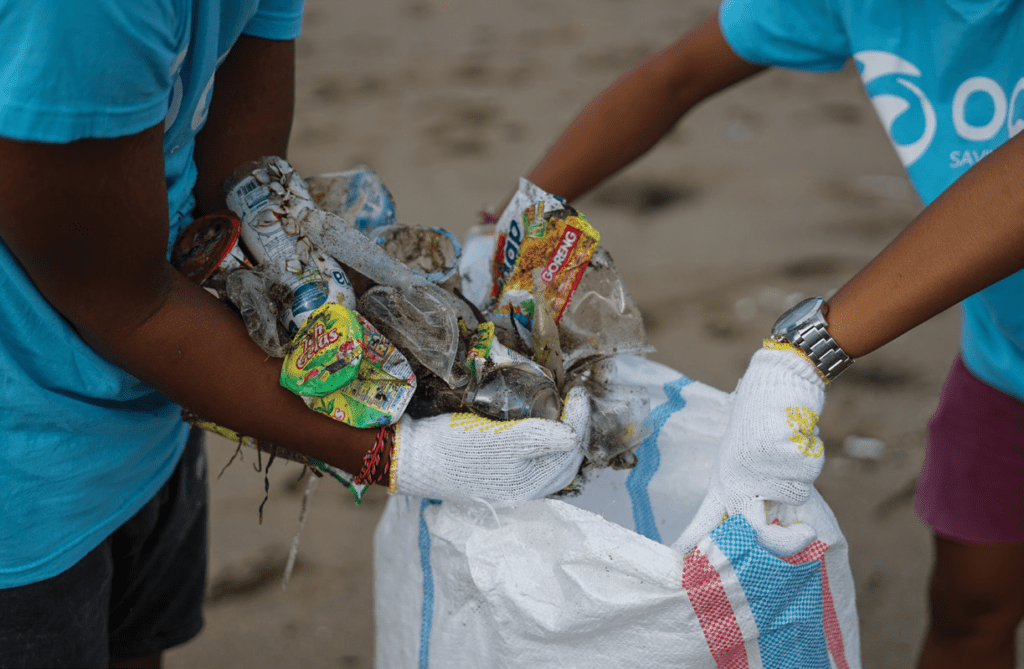The cover of National Geographic magazine was nice as usual – a picture of a small iceberg. Looking closely, though, you suddenly realize that it was a floating plastic bag. It read, “18 billion pounds of plastic ends up in the ocean every year. And that is just the tip of the iceberg.”
Then I watched Frontline’s “Plastic Wars” on March 31, 2022, showing how the plastic industry is growing like never before, while the crisis of ocean pollution is worsening. The last straw was a billboard in Pittsburgh (USA) saying: “Plastic Recycling is a Myth.” In fact, only 8% of the collected amount is really recycled in the United States.
After this, I wondered if all my efforts at sorting and putting plastic items in the recycling bin was worth it. But even if it’s just a few bottles, along with those of a million other people, at least a fraction of the plastic is not getting into the oceans.
Entire cities are now trying to address the problem. In late April 2022, the Los Angeles City Council voted to start the process of banning single-use plastics at city events and facilities and to consider a citywide ban on polystyrene products such as Styrofoam. Los Angeles County, in particular, will ban several single-use items by 2023. Its Board of Supervisors approved an ordinance that will require all takeaway cutlery or dishes to be compostable or recyclable. The County of Los Angeles is home to over 10 million people, so the positive impact of this ban could be notable.
Sheila Kuehl, a member of the Board of Supervisors, says it is “a major step forward in reducing our reliance on plastic and reducing its harm to human and marine health.” It also places a ban on the sale of expanded polystyrene foam and requires sit-down restaurants to provide guests with reusable dishes and silverware. Northern California approved a similar law. Together, these steps help the state catch up with many similar mandates already made in other states and around the world.

On March 2, 2022, at the Fifth United Nations Environment Assembly (UNEA-5), heads of state, ministers of environment and other representatives from UN member states endorsed a historic resolution to end plastic pollution. They expect to forge an international legally binding agreement by 2024. The resolution addresses the full lifecycle of plastic, including its production, design, and disposal.
The agreement would evaluate several alternatives to plastics, the design of reusable and recyclable products and materials, and the need for more international collaboration, access to technology, capacity building, and scientific and technical cooperation.
The impacts of plastic production and pollution contribute to a triple planetary crisis: climate change, nature loss, and pollution. According to UN Environmental Program (UNEP), exposure to plastics can harm human health, potentially affecting fertility, hormonal, metabolic and neurological activity. Open burning of plastics also contributes to air pollution. Also, by 2050, the greenhouse gas emissions associated with production, use and disposal would account for 15% of allowed emissions, under the goal of limiting global warming to a rise of plus 1.5 degrees Celsius. More than 80 marine and coastal species are affected by this pollution through ingestion, entanglement, and other dangers.
A shift to a circular economy could reduce the volume of plastics entering oceans by over 80%. It could also limit virgin plastic production by 55%, reducing greenhouse gas emissions by 25%, and create 700,000 additional jobs—mainly in the global south.
What we can do
One thing we can all do is consume less single-use plastic.
· Replacing liquid laundry detergent for laundry sheets saves storage space, and since they are pre-measured, they can save you money too.
· There are now shampoo and conditioner bars that not only reduce plastic use, but also reduce products that pollute the water as well.
· Reusable silicone bags are alternatives to sandwich and storage bags.
· Bamboo toothbrushes with releasable heads are entering the mainstream market.
Every day, new alternatives are being provided to help us give a hand to the planet instead of choking it with plastic.
Lucia Martinez
(Living City, USA)
Philippines: Ways forward
Opportunities exist in the country to develop integrated and comprehensive policies and strategies for plastic waste management. This includes enhancing institutional, technical and financial capacities of Local Government Units (LGUs) to manage municipal solid waste, including packaging waste.
In 2018, the Department of Environment and Natural Resources (DENR) earmarked ₱1.25 billion (US$23 million) out of a national budget of ₱27 billion (US$499 million) for the environmental protection program for clean water, air, and solid waste management.
The Philippines aims to promote 60% recovery and recycling of plastic by 2030 and offers opportunities for the private sector for technology transfer and assimilation in plastic waste management, particularly for different plastic waste streams. For example, Polystyrene Packaging Council of the Philippines, a group of 21 foam polystyrene producers, has set up a recycling plant. The Philippine Alliance for Recycling and Materials Sustainability (PARMS), a multi-sectoral coalition composed of top consumer goods companies, also plans to build a 25-million-peso (0.46-million-US dollar) recycling facility for sachets in Metro Manila.
Finally, efforts are made to formalize waste picker initiatives as Public-Private Partnership (PPP) solutions by giving informal recyclers and junk shops concessions to collect or receive materials/ to operate recycling centers (for example, in Quezon City).
www.sea-circular.org/country/philippines




